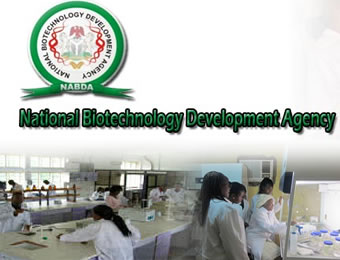Africa’s foremost biotechnology development agency, NABDA, carries out well-focused research and development in biotechnology, in priority areas of agriculture, health, industry, environment and other strategic sectors for national development and draws up programmes and policies for biotechnology utilisation, research and development in Nigeria.
NABDA’s commitment to harnessing biotechnology solutions for sustainable national development is yielding fruits, particularly at the grassroots, where there is a growing appreciation of biotechnology’s capabilities to enhance food security and improve livelihoods.
NABDA has, therefore, become a driving force in harnessing biotechnology to improve the quality of life for Nigerians and mitigate socio-economic impediments to development.
Following President Bola Tinubu’s recent declaration of a state of emergency in food security in Nigeria, the Director General/CEO of the National Biotechnology Development Agency, NABDA, Prof. Abdullahi Mustapha, has reaffirmed commitment to boosting food security in Nigeria through agricultural biotechnology.
“As an agency, we are fully aligned with President Bola Tinubu’s declaration of a state of emergency on food security. By harnessing the potential of biotechnology, NABDA is determined to revolutionise agriculture in Nigeria and ensure a sustainable and secure food supply. We are already collaborating with stakeholders, farmers, and researchers to tackle these challenges head-on,” Prof. Mustapha said.
NABDA, together with national and international partners is already driving Nigeria’s economic growth with the commercialisation of two genetically modified crops, Bt Cotton and Bt Cowpea.
Nigeria’s transgenic cowpea, which is the world’s first genetically modified Pod Borer Resistant (PBR) cowpea, is revolutionising the nation’s food production. For instance, farmers who have planted and harvested the improved variety of Bt. cowpea have attested to improved yields, reduction of pests, cost efficiency resulting from near-zero use of pesticides, and enhanced livelihood.
Other transgenic crops in the pipeline of commercialisation include TELA maize, HT soybean, among several others.
The agency has also revolutionised yam seedlings production. Its target of seven million yam seedlings has largely been successful with over two million produced and distributed to farmers.
NABDA has actively promoted the adoption of modern biotechnology practices among farmers and other stakeholders in the agricultural sector.
Through capacity-building programmes, workshops, and training sessions, NABDA has empowered farmers with the necessary knowledge and skills to effectively utilise biotechnology tools and techniques, resulting in increased crop yields and improved livelihoods.
The National Biotechnology Development Agency has successfully introduced biotechnology techniques to improve livestock breeding and management.
By leveraging the power of biotechnology, NABDA has facilitated the production of healthier and more productive livestock, leading to increased meat and dairy production in Nigeria.
In addition, NABDA is working towards a reduction in food waste through improved food processing, packaging and preservation techniques through biotechnology.
The agency’s ongoing efforts in biotechnology research and development, strategic collaborations, and capacity-building programmes will continue to play a pivotal role in boosting food security, promoting sustainable farming practices, and fostering economic growth in Nigeria. This undoubtedly strengthens the agency’s commitment to President Bola Ahmed Tinubu’s vision to tackle food insecurity in Nigeria.
Professor Mustapha has positioned NABDA as a leading institution in biotechnology research and development not only in Nigeria, but also across the African continent.
His efforts have garnered international recognition and have solidified Nigeria’s position as a key player in the global biotechnology landscape.
As Nigeria continues to navigate the challenges of sustainable development, Prof. Mustapha’s visionary approach to biotechnology will serve as a catalyst for growth, progress, and national prosperity.






